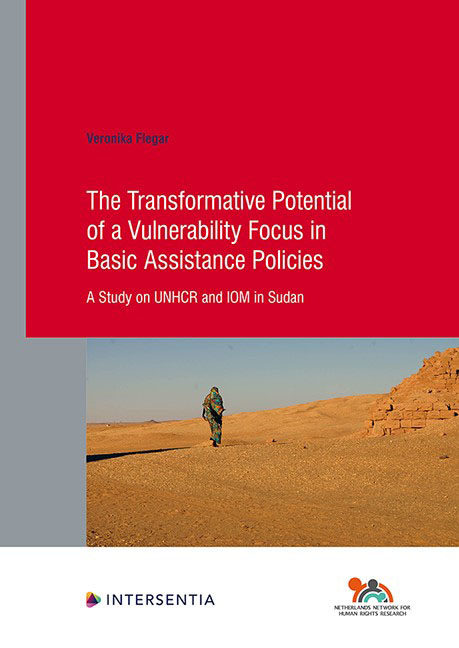 The Transformative Potential of a Vulnerability Focus in Basic Assistance Policies
The Transformative Potential of a Vulnerability Focus in Basic Assistance Policies Book contents
- Frontmatter
- Dedication
- Preface and Acknowledgements
- Contents
- List of Abbreviations
- List of Tables
- List of Figures
- Chapter 1 Introduction
- PART I NORMATIVE AND EMPIRICAL THEORY
- PART II BACKGROUND TO THE CASE STUDIES
- PART III CASE 1: ASSESSING AND ADDRESSING VULNERABILITY AT UNHCR KHARTOUM
- PART IV CASE 2: ASSESSING AND ADDRESSING VULNERABILITY AT IOM KHARTOUM
- PART V
- Bibliography
- Samenvatting
- Summary
- About the Author
- Human Rights Research Series
Chapter 4 - Methodology, Methods and Limitations of Data Collection and Analysis
Published online by Cambridge University Press: 11 November 2021
- Frontmatter
- Dedication
- Preface and Acknowledgements
- Contents
- List of Abbreviations
- List of Tables
- List of Figures
- Chapter 1 Introduction
- PART I NORMATIVE AND EMPIRICAL THEORY
- PART II BACKGROUND TO THE CASE STUDIES
- PART III CASE 1: ASSESSING AND ADDRESSING VULNERABILITY AT UNHCR KHARTOUM
- PART IV CASE 2: ASSESSING AND ADDRESSING VULNERABILITY AT IOM KHARTOUM
- PART V
- Bibliography
- Samenvatting
- Summary
- About the Author
- Human Rights Research Series
Summary
This chapter explains the methodology as well as the methods and limitations of the data collection and analysis of the two case studies. The chapter starts by providing an overview of the most relevant methodological considerations (4.1). Subsequently, the chapter outlines how the study tried to ensure the quality and trustworthiness of this research (4.2). The chapter then explains the choices regarding the data collection methods and outlines the data collection process (4.3) before elaborating on the different steps involved in the data analysis (4.4). Lastly, the chapter points out practical limitations and the limitations resulting from these data collection and data analysis choices in this study (4.5).
To recapitulate, the main research question this study seeks to answer is the following:
How can the vulnerability focus in basic assistance policies by UNHCR and IOM in Khartoum (Sudan) contribute to the vulnerability notion's alleged transformative potential for the realisation of universal human rights?
In essence, the case studies sought to shed light on the complexities of potential influences, preferences, choices and challenges that underlie the content and form of a vulnerability assessment. I was interested in diversity and variation rather than sameness or representativeness. During the research process I grouped these complexities into administrative dilemmas and contextual constraints as the two central themes that interplay with the design and implementation of the vulnerability assessment (compare Chapter 3).
METHODOLOGY
TWO COLLECTIVE CASE STUDIES AND THE GROUNDED THEORY METHOD
The study relies on two collective case studies that were analysed through Corbin and Strauss’ grounded theory method. This section explains why this combination of case studies and grounded theory method was adopted and how both approaches are thought to complement each other.
Case study research can be understood in a large variety of different ways. For the purposes of the present study, a case is defined as “a unit around which there are boundaries” and a case study is viewed as “an intensive, holistic description and analysis of a bounded phenomenon such as a program, an institution, a person, a process, or a social unit”. The present analyses of UNHCR's and IOM's vulnerability-focused basic assistance policies are case studies because the objects of these two case studies are clearly delimited (namely two specific vulnerability-focused basic assistance policies). This delimitation is “the single most important” distinguishing feature of a case study compared to other qualitative research methods.
- Type
- Chapter
- Information
- The Transformative Potential of a Vulnerability Focus in Basic Assistance PoliciesA Study on UNHCR and IOM in Sudan, pp. 69 - 110Publisher: IntersentiaPrint publication year: 2020


